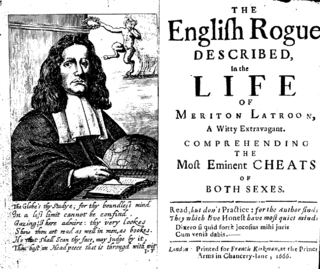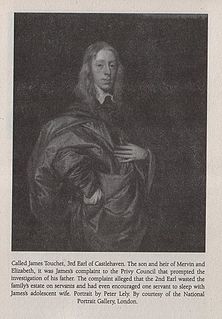 W
WUlick MacRichard Burke, 1st Marquess of Clanricarde, 5th Earl of Clanricarde, 2nd Earl of St Albans, was an Irish nobleman who was involved in the Wars of the Three Kingdoms. Lord Clanricarde was a Catholic Royalist, who had overall command of the Irish forces during the later stages of the Cromwellian conquest of Ireland. He was created Marquess of Clanricarde in 1646.
 W
WLieutenant-General James FitzThomas Butler, 1st Duke of Ormond, KG, PC (1610–1688), was an Irish statesman and soldier, known as Earl of Ormond from 1634 to 1642 and Marquess of Ormond from 1642 to 1661. Following the failure of the senior line of the Butler family, he was the second representative of the Kilcash branch to inherit the earldom.
 W
WJohn Bysse (c.1602–1680) was a member of the Parliament of Ireland during the 1630s and 1640s. He was excluded from office during the Interregnum, but became one of the most senior Irish judges after the Restoration of Charles II.
 W
WCharles Lambart, 1st Earl of Cavan was an Anglo-Irish Royalist soldier and peer.
 W
WCharles Coote, 1st Earl of Mountrath was an Anglo-Irish peer, the son of Sir Charles Coote, 1st Baronet, and Dorothea Cuffe, the former being an English veteran of the Battle of Kinsale (1601) who subsequently settled in Ireland.
 W
WSir George Hamilton, 1st Baronet, born in Scotland, inherited land in Ireland and fought in the Irish Army for the royalists under his brother-in-law James Butler, 1st Duke of Ormond during the Confederate Wars and the Cromwellian conquest of Ireland. He was father of Antoine Hamilton, author of the Mémoires du comte de Grammont, of Richard Hamilton, Jacobite general, and of Elizabeth, Countess de Gramont, "la belle Hamilton".
 W
WRichard Head was an Irish author, playwright and bookseller. He became famous with his satirical novel The English Rogue (1665) – one of the earliest novels in English that found a continental translation.
 W
WLieutenant-General Michael Jones, circa 1606 to 10 December 1649, was an Irish-born soldier of Welsh descent who served in the War of the Three Kingdoms, primarily in Ireland.
 W
WSir Theophilus Jones, was an Irish soldier and government official of Welsh descent. One of five sons born to Lewis Jones, Bishop of Killaloe in the Church of Ireland, he formed part of a close-knit and powerful Protestant family.
 W
WSir Donough MacCarty, 1st Earl of Clancarty (1594–1665), was an Irish magnate, soldier, and politician. His title was 2nd Viscount Muskerry from 1641 to 1658. He rebelled against Charles I, King of England, Scotland, and Ireland, demanding religious freedom as a Catholic and defending the rights of the Gaelic nobility in the Irish Catholic Confederation. Later, he supported the King against his parliamentarian enemies in the Cromwellian conquest of Ireland, a part of the Wars of the three kingdoms, also known as the British Civil War.
 W
WRandal MacDonnell, 1st Marquess of Antrim (1609–1683) was a Roman Catholic landed magnate in Scotland and Ireland, son of the 1st Earl of Antrim. He was also chief of Clan MacDonnell of Antrim. He is best known for his involvement, mostly on the Royalist side, in the Wars of the Three Kingdoms.
 W
WMurrough MacDermod O'Brien, 6th Baron Inchiquin, 1st Baron O'Brien of Burren, 1st Earl of Inchiquin, was known as Murchadh na dTóiteán in reference to extensive burnings of the Irish who would not convert to Anglicanism.
 W
WSir Phelim Roe O'Neill of Kinard, was an Irish nobleman who led the Irish Rebellion of 1641 in Ulster, which began on 23 October 1641. He joined the Irish Catholic Confederation during the Wars of the Three Kingdoms, in which he fought under his kinsman and second cousin, Owen Roe O'Neill in the Confederate Ulster Army. In 1653 Phelim O’Neill had sought refuge from the British on an old crannog in Roughan Lough while staying at Roughan Castle but was captured after his hideout was betrayed.
 W
WGiovanni Battista Rinuccini (1592–1653) was an Italian Roman Catholic archbishop in the mid-seventeenth century. He was a noted legal scholar and became chamberlain to Pope Gregory XV. In 1625 Pope Urban VIII made him the Archbishop of Fermo in Italy. In 1645 Pope Innocent X sent him to Ireland as Papal Nuncio. He brought money and weapons to help the Confederate Irish in its conflict against the English Parliamentarians. Rinuccini became the dominant figure of the hard-line Clerical Faction of the Confederates refusing the alliance with the Irish Royalists.
 W
WSir Robert Talbot, 2nd Baronet (c.1610–1670) was an Irish landowner, soldier and politician of the seventeenth century.
 W
WJames Tuchet, 3rd Earl of Castlehaven was the son of Mervyn Tuchet, 2nd Earl of Castlehaven and his first wife, Elizabeth Barnham. Castlehaven played a prominent role in the Wars of the Three Kingdoms that took place in the middle of the 17th century, and was particularly active in the conflicts in Ireland at this time.
 W
WSir William Vaughan was a cavalry officer in the armies of Charles I of England. Initially serving in Ireland during the Confederate Wars, the outbreak of the First English Civil War led to him being sent to England in 1644, at the head of an Anglo-Irish cavalry regiment, to reinforce the Royalist army.
 W
WSir Hardress Waller, was an English Protestant who settled in Ireland and fought for Parliament in the Wars of the Three Kingdoms. A leading member of the radical element within the New Model Army, he signed the death warrant for the Execution of Charles I in 1649; after the Stuart Restoration in 1660, he was condemned to death as a regicide, a sentence commuted to life imprisonment.